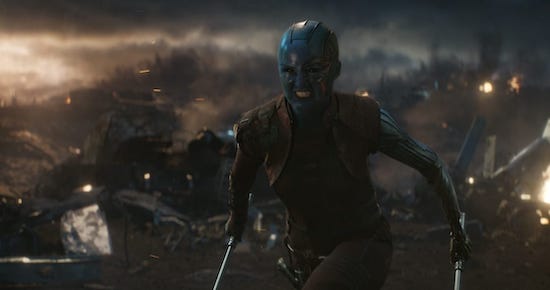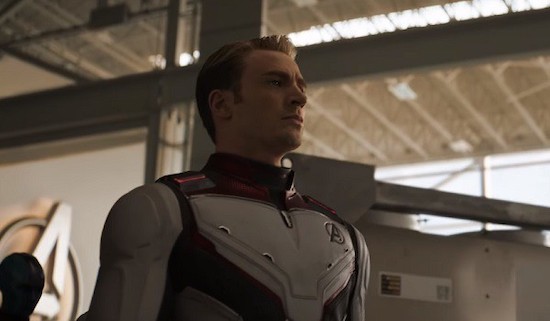Given absolute power, the sudden capacity to do literally anything, without limit, what would you do? For the heroes of Marvel’s Avengers: Endgame, the answer is apparently, make everything just the way it was five years ago. With a snap of their fingers, everything is unchanged, everything back to ‘normal’, business as usual. Click.
Endgame, and the mammoth twenty-two film saga that it brings to a close – or at least some brief respite before the inevitable reboot – is undoubtedly one of the most ambitious works of silver screen science fiction in recent years. It is also, without question, one of the most nostalgic. From beginning to end, the Marvel Cinematic Universe has been one long paean to the past. It has consistently rhapsodised over fantasised ‘golden ages’. Every beat, every shot, every line of dialogue is either deliberately constructed by its producers as a reference or homage to some older, supposedly ‘classic’ film – or, failing that, received as such by its fans, regardless. The series constantly eulogises classic Hollywood cinema, even as it erodes the conditions of cinema.
For the Avengers films are not cinema. They resemble cinema only in the size of their budgets. On every formal, structural level, the products of the Marvel Cinematic Universe are far more like TV than film. Even in this supposed ‘endgame’, half the narrative is spent teasing and opening up new paths for the narrative to go down, new hooks, twists, devices to keep the audience expecting more. As the University of Glasgow’s Christine Geraghty once wrote of soap operas, Marvel films are in principal neverending. Before one of the multiple interlocking story strands get tied, another – still dangling – has usurped it in importance. Narrative closure is endlessly deferred.
Or rather, perhaps it would be more accurate to say that the Avengers films and their multiple spin-offs partner franchises are contributing to the continual erasure of any distinction between film and TV that has been ongoing for some time now. What we have in their place, is really neither one thing nor the other but a kind of grey goo somewhere in-between, which it is tempting to follow convention and label, simply, ‘content’. The word has the distinct advantage of being relatively innocent of any romantic associations with artistry, which would seem inappropriate to a genre whose major works have been so relentlessly instrumentalised.
Much digital ink has been spilled since the turn of the new century about the transformation of television, its own supposed ‘golden age’ (an adjective which, given the context, we must presume refers more to the exchange value of gold than anything especially premier cru about it). Far less has been said about the concomitant change in what film is, how it is experienced and what we expect from it. At the very centre of these changes has been the Disney Corporation, whose mantra, throughout has been twofold: to acquire and maximally exploit as much intellectual property as possible; to defer to the will of the most vocal fans in all matters (hence, presumably, the apparent dismissal of Rian Johnson, director of by far the best Star Wars film of the last twenty years – and arguably of all time).
But what has happened to cinema is also inextricable from the logic of streaming media itself, whose algorithms tend to privilege the inoffensive, the ok-that’ll-do-for-now, over the strange, the stirring, and the extraordinary. It is a logic of micro-compartmentalisation (Netflix’s infamous personalised subgenres, whether “Films With A Strong Female Lead” or “Period Pieces About Royalty Based on Real Life”), of endless variation on increasingly reductive formulae, of imitations and knock-offs given new life by the mechanics of the search function (see The Silence). It is a logic that knows only how to repeat a known success, not how to take a risk something remarkable. It is a logic of repeat and return.
At the centre of which is a series of increasingly bland star actors, all of whom seem to be called Chris. In the 1980s, movies tended to be overwhelmed by the charisma of their leading cast members, often to the detriment of every other aspect of the film. The blockbusters of the era were often very bad, but at least they had personality. This is because actors – and their agents – were the most powerful people in Hollywood. This is no longer the case. Today, the IP lawyers are the most powerful people in Hollywood and actors are regarded as largely interchangeable. Hence a generation of actors who come across, even to the audience, as largely interchangeable. Who, honestly, can recall the names of the actors – let alone the directors – behind the masked heroes in the various Avengersfilms ? Who could even tell them apart in a line-up?

One of the strangest things about Avengers: Endgame, a film ostensibly about the ravages of grief, is its strange lack of affect. Aside from one surprisingly moving scene between Thor and his mother, characters scarcely react to the extraordinary and frequently traumatic or incredible events that befall them. Partly because they don’t have the room too. There is too much plot to fit in, too many loose ends from a seemingly endless parade of films that must carefully correlate and reference each other ouroboros-like to at once tie up and carefully untie. But also because the actors themselves increasingly feel like no more than props, so clearly subordinated to the brand identities they are all-too-temporarily inhabiting.
As if to compensate for the blandness of the cast, the characters they inhabit are gifted with increasingly fantastic powers and abilities. Since they do not obviously exhibit any noticeable charisma, we must be informed of their vast reserves of it. Over the last decade or so, Hollywood has taken a distinctly messianic turn. There has always been an element of this to all action pictures. But the trope of the ordinary guy in extraordinary circumstances has today been almost completely usurped by various figures of the chosen ones. This is not restricted to the inundation of superhero films, which are only its most obvious manifestation. Films like Ready Player One, The Hunger Games, not to mention the Harry Potter and Lord of the Rings franchises, all participate in the production of messianic figures, characters variously fated to lead and to unite due to some extraordinary inherent trait of character. All of these films are centred around a figure who is given the opportunity to sway vast numbers of people, to mobilise, and to change the world, to effect great transformations in their environment – opportunities which take advantage of in order to do… nothing. Nothing whatsoever.
Recall the end of Ready Player One. Our hero, Wade (played by someone called Tye Sheridan) has just led what amounts to a massive popular uprising, routed the government of their virtual world, and violently seized power. Then – just at the moment when you expect him to announce sweeping reforms, devolved powers, a more egalitarian form of ownership and control – he triumphantly announces that absolutely nothing will change. A status quo, already established as thoroughly corrupt, exploitative and open to manipulation by hostile forces, is to be studiously maintained in every detail.
Or take the climax of Endgame itself. Gifted with the ultimate power of all six infinity stones, the absolute promise of anything imaginable at the click of their fingers, the Avengers confine the exercise of this mastery to just one sole act: a simple reincarnation of all those killed by Thanos’s own finger-click five years previously. Power employed only as reaction, as the undoing of some recent catastrophe and return to the imaginary prelapsarian idyll of just five years previously. The parallel with the desires of those continuity Democrats or #FBPE Twitter accounts for whom all would apparently be right and true in the world if only the twin cosmic disasters of Trump and Brexit could be undone is, of course, too obvious to require labouring.
A quarter of a century ago, as one part of a call for a New International, issued in his book Spectres of Marx, Jacques Derrida called for a “messianic without messianism”. That is, a recuperation and revitalisation of the “messianic” promise of a new society, the conviction that another world is possible, without the need for a spiritual or redemptive messiah figure to guarantee and ground it. In the years since then, Hollywood cinema has served up precisely the opposite: a messianism without messianic. Endless parade of factory-farmed Jesuses devoid of hope or any possibility of utopia.
Avengers: Endgame is at UK cinemas now… and forever


